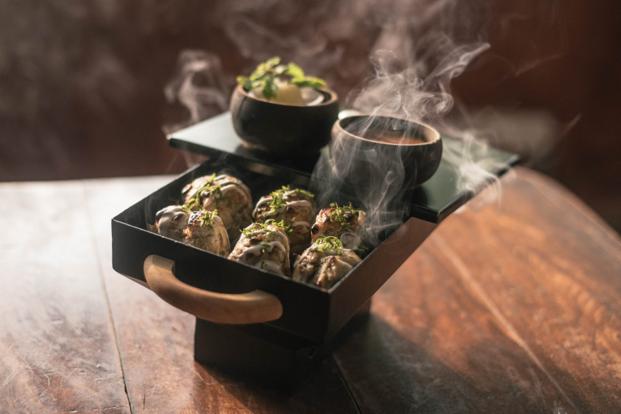A “permit room”, for those too young to remember, used to be a section of a restaurant where it was permitted to serve alcohol (usually only to men)—a relic of the prohibition in India. It might just be possible to find an actual permit room tucked away in some Mumbai by-lane, but for those not willing to work that hard, a visit to The Permit Room in Bengaluru might be warranted. With its prime corner location (a short walk from MG Road), kitschy, radically “extra” decor (one wall is wholly given over to Adarsh Balak comics), and happy buzz, The Permit Room has all the qualities necessary to appeal to the maniacally outgoing Bengaluru pub-hopper. But those who take their pub food seriously keep coming back here for the kuzhi paniyaram sliders stuffed with mutton kheema, nizami haleem samosas, Kerala beef fry (served on Kerala coin parottas), lamb brain fry and other dishes tough to get outside military hotels and toddy shops.
When The Permit Room (started by the same quartet of restaurateurs that run the popular microbrewery chain Toit) opened doors in 2016, the plan for the menu was simple: look at the wide variety of south Indian snacks and food, especially locally popular non-vegetarian dishes, for inspiration. “It works because people here are used to eating all kinds of meat—not just chicken and some variants of mutton and fish, which pub-goers in Mumbai and Delhi are more comfortable with,” says Sibi Venkataraju, one of the founders of the F&B group. “There are enough people here who eat both pork and beef, thanks to the Coorg and Mangalorean food cultures and the influence of Chettinad and Kerala cuisines.”
His opinion is echoed by Manu Chandra, chef and partner at Monkey Bar and Toast & Tonic. “The pool of south Indian food cultures is so vast that we haven’t even begun to dig deep, and this is reflected in how Bengaluru pubs (or brands that started here before branching out to other cities) have grown beyond the usual nachos and French fries,” he says. When Monkey Bar first opened in 2012 in Bengaluru, Chandra started serving up small plates that straddled the vast variety of Indian snacks and starters: Goan sorpotel and chorizo with pav, beef galouti kebabs, Rajasthani kair sangri ki sabzi and laal maas tacos, and Bengali mochar chop. With special menus and festivals, Monkey Bar continues to take patrons across cities on gastronomic journeys—from coastal Karnataka and Kerala specials to the current Kolkata Street Food Festival.
It’s not just about the wholesale adoption of dishes either. Adapting regional flavour profiles, such as using curry leaves, mustard seeds and asafoetida (Chandra calls it “the holy trinity of south Indian cooking”) or Bengali paanch phoron (five- spice mix) to flavour oils that can be used to baste or glaze, it has been an interesting journey for chefs like Chandra looking to upgrade Indian pub grub. Today, you’d have to look very hard to find a pub that doesn’t serve at least some dishes inspired by regional Indian food.
The Old Fashioned Bar, a month-old pub in Bengaluru’s Koramangala, serves appetizers like the Uru Chaat, a mix of southekayi (cucumber), pineapple, and “Congress masala” (a uniquely Bengaluru name for flavoured peanuts). “It’s a mash-up of street food, including cut fruits, that are served on carts around Bengaluru,” says consultant chef Tanmoy Savardekar. The menu here also features Nippat Masala (a nippat is a savoury cracker dunked into tea, popular in Karnataka and Kerala), Andhra Chilli Chicken (popularized by the several Andhra “meals” restaurants in the city like Nagarjuna and Nandhana in which the main ingredient is a green chilli sauce), Bannur lamb chops and Coorg pandhi curry. The theme, clearly, is “Bengaluru comfort food”.

A few years ago, Gresham Fernandes, culinary director of Impresario Entertainment and Hospitality, the company that runs Social and Smoke House Deli, started a culinary experiment called the Gypsy Kitchen—a peek into homes in Mumbai neighbourhoods like Bandra and Khar and food cooked by Bohri, Parsi and Anglo-Indian home chefs. “Many of the dishes from those pop-ups found their ways to the menu at Social,” says Riyaaz Amlani, CEO, Impresario. Though the food at Social’s many outlets (18 at last count) across the country has European pub-grub influences, at least 20% of the menu is “inspired by the pin code”, says Amlani. “The menus are similar, but not the same. In Bengaluru, you’ll find more pepper-spice; in Delhi, it will be more chilli-spice…. Bengaluru will have ghee roast chicken and Delhi will have kulchas. Some favourites like mutton dhansaak, laal maas pao, and Goan prawn curry are in all the menus,” says Amlani.
Incidentally, Chandra has now turned his attention to food from the east—Bihar, Odisha, Assam, Nagaland, etc.—where most of his staff comes from. “The boys make something at home, and they bring it in a tiffin-dabba and say ‘chef taste this’. I’ve found some amazing dishes this way—from litti-chokha to an Assamese dish of fish, radish leaves, dry salted radish and bamboo shoots (xolé molé),” says Chandra.
It’s indeed glorious to think that India’s next big food revolution may come not from the kitchens of celebrity global chefs but from the tiffin-dabbas of boys who have travelled across the country to work in the service industry, and brought their food with them.







